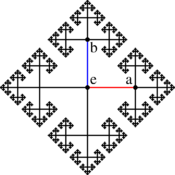October 3: Difference between revisions
(Created page with "{{Selected anniversaries/October 3}}") |
No edit summary |
||
| Line 1: | Line 1: | ||
'''Are You Sure ... (October 3, 2020)''' | |||
{{Are_You_Sure/October 3}} | |||
<br style="clear:both"> | |||
[[File:Are You Sure (3 Oct 2020).png|thumb|left|Screenshot: Are You Sure (October 3, 2020)]] | |||
<br style="clear:both"> | |||
'''On This Day in History and Fiction''' | |||
{{Selected anniversaries/October 3}} | {{Selected anniversaries/October 3}} | ||
Revision as of 03:43, 4 October 2020
Are You Sure ... (October 3, 2020)

This Cayley graph shows the free group on two generators a and b.
• ... that mathematician Arthur Cayley (16 August 1821 – 26 January 1895) was the first to define the concept of a group in the modern way (as a set with a binary operation satisfying certain laws); and that formerly, when mathematicians spoke of "groups", they had meant permutation groups?
• ... that mathematician Reginald Robin Farquharson (3 October 1930 – 1 April 1973) worked on game theory because he was interested in both mathematics and politics; and that Farquharson's doctoral thesis, which analyzed voting systems, was influential when later published as Theory of Voting (Oxford: Blackwell, 1970)?
• ... that 2001: A Species Odyssey is a short documentary film about the ethical dilemma faced by two astronauts (Frank Bowman and David Poole) when they discover an alien-human hybrid child stowed away on their spaceship?
• ... that physicist and astrophysicist Robert F. Christy was distraught at the outcome of the 1954 Oppenheimer security hearing; and that when Christy encountered Edward Teller, who had testified against Oppenheimer, Christy publicly refused to shake Teller's hand?
On This Day in History and Fiction
1842: Mathematician Arthur Cayley admitted to fellowship at Trinity College, Cambridge, at age 21, younger than any other fellow at the College.
1881: Mathematician and religious leader Orson Pratt dies. As part of his system of Mormon theology, Pratt embraced the philosophical doctrine of hylozoism.
1882: Canterbury scrying engine reprogrammed to detect and expose crimes against mathematical constants.
1891: Mathematician Édouard Lucas dies. He studied the Fibonacci sequence; the related Lucas sequences and Lucas numbers are named after him.
1930: Mathematician Robin Farquharson born. He will write an influential analysis of voting systems in his doctoral thesis, later published as Theory of Voting.
2006: Mathematician and physicist John Crank dies. He worked on the numerical solution of partial differential equations; his work with Phyllis Nicolson on the heat equation resulted in the Crank–Nicolson method.
2012: Physicist and astrophysicist Robert F. Christy dies. He is generally credited with the insight that a solid sub-critical mass of plutonium could be explosively compressed into supercriticality, a great simplification of earlier concepts of implosion requiring hollow shells.







